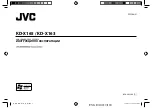
Techno Tidbits and Problem-solving
97
EX
P
E
RT
DTS-ES
DTS launched a new surround format in November 2000. This has come to be known as DTS Extended Surround or
simply DTS-ES. The technology has been advanced to include two new home formats DTS-ES Discrete 6.1 format,
and DTS-ES Matrix 6.1 ch format, both are able to playback discrete, 6.1-channel content from DVDs and CDs. Both
of these formats are compatible with a conventional DTS 5.1 ch decoder. In this system each channel is encoded
and decoded individually, adding to the separation of the channels. Since DTS adds a third surround channel, the
surround back channel, the realism and all-encompassing nature of the sound reaches levels not seen before in
home theater. This unit is equipped with a DTS-ES decoder.
DTS Neo:6
This is a matrix decoding technology that transforms two-channel sources into 6.0 channel surround sound. There
are two modes, CINEMA mode and MUSIC mode.
DTS 96/24
For compatibility with equipment that was produced before this format was made, DVD players can play this
software using a conventional DTS 5.1ch decoder. This unit is equipped with a DTS 96 kHz/24 bit decoder to take
advantage of the higher sound quality available.
THX
THX is a Lucasfilm, Ltd. program dedicated to maximum accuracy in movie presentation. Movie sound tracks are
recorded in large movie dubbing stages using movie theater equipment. For a sound track to be presented
accurately in your home, special technologies are required. In your home the room is much smaller and has a
bright sound, the speakers are very different and there are only six-eight of them, plus, you sit much closer to each
one of those speakers. Because of these differences we often miss the power and emotion that thrills us in a good
movie. Now Pioneer and THX have teamed up to bring the full glory of accurate cinema sound to the comfort and
convenience of your home.
Re-Equalization™ :
In a theater the room is very large and dead sounding, you sit a long way back from the
speakers and the speakers themselves are very specialized. Because a sound track recorded in this dead sounding
space when it is played at home it sounds overbright. THX Re-Equalization adjusts for this difference in a very
precise way.
Adaptive Decorrelation™ :
When a sound track sends mono sound to the surround speakers it often seems to be
coming come from one side instead of from all around you as it would in a theater. Adaptive Decorrelation helps to
correct this inaccuracy.
Timbre Matching™ :
When recording a sound track it is very important that the surround sounds move smoothly
and seamlessly around the theater. It is very distracting when sounds seem to jump from speaker to speaker. Timbre
Matching helps to smooth the movement of the surround sounds even though you are using only two speakers.
Bass Peak Level Manager™ :
Some Dolby Digital sound tracks can produce bass peaks that are undesirable in a
home theater environment. The Bass Peak Level Manager allows you to set the maximum peak levels appropriate to
your system. Set this function according to the
Bass Peak Level
instructions (page 94).
Loudspeaker Position Time Synchronization™ :
This feature allows you to adjust for the difference in the
distance from each individual loudspeaker to the listening position. Doing this ensures that all the speakers operate
in precise synchronization improving the seamless nature of the soundfield. Set this function according to the
Speaker Distance
instructions (page 42) or
Fine Channel Delay
instructions (page 88).
THX Surround EX™ :
THX Surround EX–Dolby Digital Surround EX is a joint development of Dolby Laboratories
and the THX division of Lucasfilm Ltd.
This product may also engage the "THX Surround EX" mode during the playback of 5.1 channel material that is not
Dolby Digital Surround EX encoded. In such case the information delivered to the Surround Back channel will be
program dependent and may or may not be very pleasing depending on the particular soundtrack and the tastes of
the individual listener.
00_VSX-53TX.book Page 97 Monday, April 7, 2003 11:07 PM











































